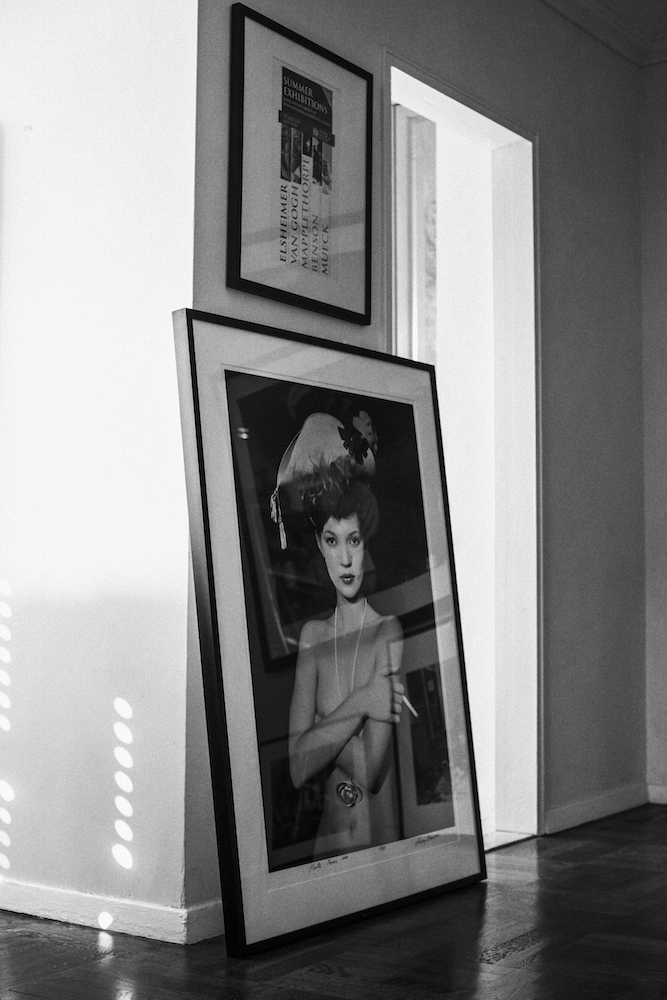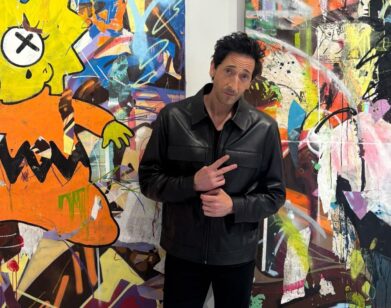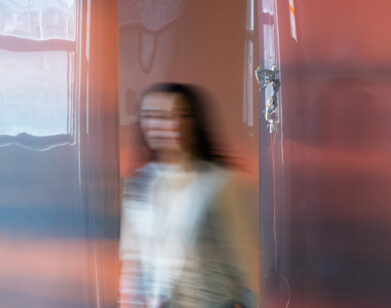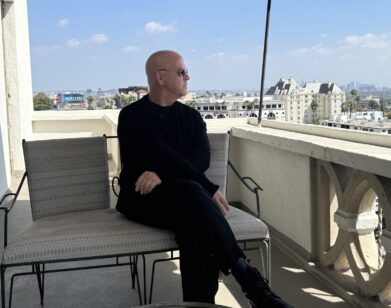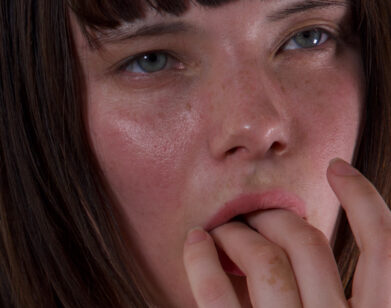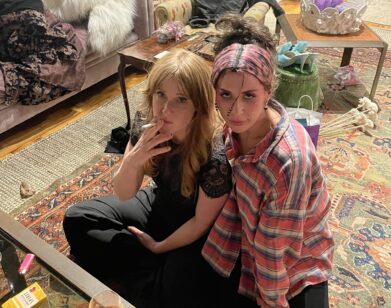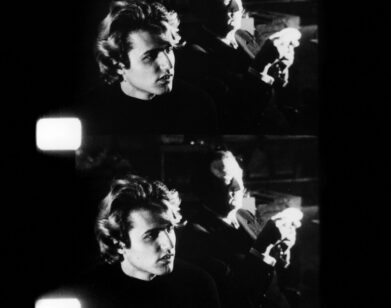Harry Benson
HARRY BENSON IN NEW YORK, DECEMBER 2016. PHOTOS: VICTORIA STEVENS.
At age 87, Harry Benson still cites an early failure in life as having propelled him forward. Back in his hometown of Glasgow, Scotland, he was expelled from school at age 13—for being “stupid” as he tells it. But this story does not continue as the sad tale of a rejected adolescent; the defeat, fortunately, made Benson all the more ambitious. He turned toward photography, and published his first image in a local paper in 1946.
While most are not familiar with that early shot of a deer in a zoo, it’s the start of an astonishing pool of subjects amassed by Benson; there’s each US president since Eisenhower (John F. Kennedy, Lyndon B. Johnson, Richard Nixon, Gerald Ford, Jimmy Carter, Ronald Reagan, George H.W. Bush, Bill Clinton, George W. Bush, and Barack Obama) and our President-elect holding a million dollars at the Trump Taj Mahal, or, with any of his wives (notably Melania Trump in their gilded home). There’s also Frank Sinatra and Mia Farrow, in masks; Martin Luther King and Civil Rights marches; refugee camps in Somalia; the IRA; Robert F. “Bobby” Kennedy’s assassination; the KKK; the Beatles as they first arrived in the US; John Lennon’s killer; Michael Jackson at Neverland Ranch; Muhammad Ali; and a couple from either side of the Berlin Wall, mid-kiss.
These stories, and the recollections of fans and former subjects such as Jay McInerney, Dan Rather, Alec Baldwin, Donald Trump, Sharon Stone, André Leon Talley, and Ralph Lauren, are the focus of a new documentary on Benson. Directed by Matthew Miele and Justin Bare and titled Harry Benson: Shoot First, it’s an apt profile of the man behind several images that are synonymous with “iconic”—many of which are currently on display in New York at Staley-Wise Gallery.
While Benson is blunt and unyielding in his beliefs when it comes to photography, he (and his wife Gigi) are more than welcoming when we meet at their apartment on the Upper East Side earlier this month. By the end of our conversation, Harry Benson was holding open the door to the elevator, continuing with stories even as its alarm started to sound.
HALEY WEISS: Was there anything said in the film about you or your work that surprised you?
HARRY BENSON: Yes—about three people called me a genius.
WEISS: Were you happy with that?
BENSON: It put me into shock. [pauses] I’ve always been anonymous—that’s the position I should be. And it’s hard to say why or how you did something; it just happens. I’ve basically followed a camera all my life. I follow it and it’s fun. The thing about photography is that every day is a new day, even if you’re working on the same story, because every day you’ve got a chance to correct what you did the day before, and try to take it a bit further or a bit back.
WEISS: In the film you talk about how some photographers say they have a sense of ethics, and that’s why they don’t take a shot, but it’s actually that they didn’t have the guts to take the shot. Do you have an ethical code that you abide by?
BENSON: My ethics are basically around animals. I can’t do animals in distress. I was able to shut myself off with humans, and in a strange way, if you go through violence, you come out stronger at the other end than what you went in. … I’ve never seen anything like [the refugee camps in Somalia]—people just dying, even the ones who looked all right, in a few hours they were gone. That was really just awful.
WEISS: Were you able to turn your emotions off in that case too? Did you have to?
BENSON: You have to, yes, and also you’ve got a responsibility to bring it back. But these big camps—all the ones I’ve been in—have been run by gangsters. They get the money, or most of the money, and they’ll commandeer the food and give it out. It’s not a good thing. They’ve never found a way to do it.
WEISS: You said in the film that you’d regret not taking a picture. Are there any photographs you regret not taking or have you always taken the photo?
BENSON: There are pictures I’ve regretted not taking, but I forget about them, because there’s no point—I didn’t take them. [laughs] But I would’ve regretted not taking Bobby Kennedy’s assassination, because it was so historic. And there were things about [John F. Kennedy’s assassination in] Dallas, like the Grassy Knoll, and all the different things [said] about different people—that everything, I felt, had to be photographed. Also, when I got back to my hotel in Los Angeles, I called the FBI to come and look at the pictures, and they never came. In the contact sheets there might be a picture of you there and you said you weren’t there, but they never came. I came back to New York and did the same thing, and they still haven’t come.
WEISS: That’s surprising, especially because there are always such conspiracy stories around those events.
BENSON: Yes. And if they don’t come twice—it might’ve been three times I called—I don’t want to start drawing attention to myself. [laughs] It’s not good to draw the attention of those people.
WEISS: You’ve said that you think Bobby Kennedy would’ve understood why you photographed it, or you hope that if you meet him again, he will understand.
BENSON: Well, I’m saying that… You know, he’s been murdered, and blood is pouring out his head, and his wife is screaming. And people say to me, “Did you have nightmares?” Because I do wake up at night—not having a nightmare, I would’ve had a nightmare if I hadn’t photographed it, because I had to. Because that’s what I am and was and that was my being; I was a hard news photographer. I wasn’t a fancy photographer, precious, [whispers] “Oh, I can’t take that.”
WEISS: So in a way, you’re saying your obligation is to being a journalist, to history, rather than the sensitivity of the subject?
BENSON: That’s a nice way of putting it. Basically, I wanted to stay on the payroll at the end of the week—that plays a major role.
WEISS: You mentioned earlier how you were surprised that people called you a genius in this documentary, and you’re framed as a legend—
BENSON: That’s embarrassing, and it’s stupid, especially when you know you’re stupid. [both laugh] Do you know what the word legend means? Do you know what it means to me?
WEISS: What?
BENSON: I’m old—that’s all that means. I’ve been around long enough; I’ve been taking photographs a long, long time. I mean, I’ve photographed every American president since Eisenhower—that’s a long time. And I was taking pictures before that. It was 1964 when the Beatles arrived; that’s a long time as well. I was a Fleet Street photographer then, I was a seasoned street photographer, a news photographer. So my career didn’t start when I came off of the plane with the Beatles. I knew what I was doing, up to a point.
WEISS: How did you get from that first photograph that was published, of the deer in Glasgow, to Fleet Street?
BENSON: Just banging about—there’s no straight path to anything. Even with the Beatles, you think, “Well, this will help me”—sure, it helped me, but the Beatles were only talking about surviving for 15 months. Paul and John said, “Oh, we could do Broadway plays or West End London plays,” George was talking about being a classical guitarist, and Ringo wanted to open a lady’s hairdresser. They were talking within 15 months, because that was all a rock ‘n’ roll [band had]—that was the lifespan. So I wasn’t in a place to get carried away with that. It was, “What have you done for us today?” It’s not like you go back and you sit on your laurels—no way. I came here with the Beatles, I did the Ed Sullivan show, then I did Ian Fleming, then I was straight into Civil Rights with Martin Luther King.
WEISS: Was that a jarring transition? To go back to the Fleet Street style of journalism you had been doing prior?
BENSON: No—that was what I wanted to do. I didn’t want the Beatles, because I was going to Africa. I wanted to do that. But you do what you’re told.
When I went on [with the Beatles], it was a music story in Paris, and within two days it became a big news story, because the Beatles were hitting number one, two, three, four, right on top of all of these [charts]. All of this music was sensational. So, journalists from all over the world were flying in—big time ones. It wasn’t a music bunch; it was a news bunch because the Beatles were a phenomenon. And they’re still with us. Their music is so good. Nobody comes near them, really. But that’s not what I’m thinking then; I’m thinking about 15 months if that’s what Paul and John are giving it. It was probably about two months [I spent with them], then again another couple of weeks, then I did A Hard Day’s Night. But then I really wanted off of it. You know, after you’ve done the Beatles, who wants Hall & Oates? [both laugh] But I did a bit on the Who and a bit on the Stones, and I did a lot on Michael Jackson, but that was all spaced out over years.
WEISS: In the film it’s said that a lot of subjects think they’re your friends.
BENSON: I don’t think any of them are my friends.
WEISS: Was it more difficult to photograph the man who killed John Lennon, Mark David Chapman, because you knew Lennon? Or is it all just your assignment?
BENSON: It’s an assignment, but I wanted to meet the bastard. Terrible thing. John was a completely decent guy; he wasn’t show business. He really wanted, genuinely, to help people. And I like Paul.
WEISS: I know Chapman took you aside, and he spoke to you, to apologize or explain what he did. When you have the camera, you can maybe turn off your emotions, but can you do it in that situation? When you’re face-to-face with someone?
BENSON: Yeah, sure. He was washed, he was clean, he had got himself all ready, he had been working out. And I asked him why he did it, and he said because he heard John’s voice early in the morning, last thing at night, and he couldn’t take anymore. Which is an excuse, which is a reason, but he’s still mad. And I hope he doesn’t get out, because I know he’ll come down here looking for me.
WEISS: Is there anything you’ve never been asked about your work or never had the opportunity to say about your work that you would like to say now?
BENSON: I’m having a Lifetime Achievement Award from ICP, and the Queen made me a Commander of the British Empire, and I don’t mind saying that because I had to leave school when I was 13 for no other reason than I was fucking stupid, excuse my language. It always made me a bit bitter, and I know nobody else in my school got shit, so I don’t mind showing off a bit. But I wish I had all of these honors when I was 22. [laughs] I’ll take it, I’m not going to be coy. You know, there are [photographers like] Richard Avedon and you couldn’t speak to him he was so grand. [mimics Avedon] “Oh, in a moment please.” He took shit pictures in the studio. Genteel, precious, all his little handlers. … That’s so pretentious. It’s so arrogant. You gather by what I’m saying, I’m not impressed by studio photography. Did you like the documentary?
WEISS: I did. It’s interesting to hear the relatives of your subjects speak about how they felt about the photos, like the photo of Greta Garbo swimming—I believe it was her nephew who spoke.
BENSON: I liked him. I enjoyed listening to his opinion. Greta Garbo cannot be ignored. There’s a woman who went to great pains, “I want to be alone,” and, “Don’t look at me.” She lived on East 54th between 3rd and 2nd for years. She’d slink out with a hat on. But now she’s swimming in front of me. She just came swimming! I was a bit lucky that I was there, but you’ve got to be prepared.
And then you come to points of view, and people will say, “Well, you’ve got to see their point of view,” like, “He was tired, he’d been working.” And you know something—to hell with their point of view. There’s only one point of view; that is your point of view. You’re making a mistake if you see their point of view. There’s only one and that’s your livelihood. You see people on their deathbed doing things; surely a piece of shit actor can do something. … That might not be very nice about it, but I say that because I’ve been messed up thinking of people’s points of view, and both times, the person went and did it for another photographer. So it all makes you like an old dog that let the burglar in the house, but by Christ he’s going to get the fucking postman. [laughs] If I was giving advice, that’s the one I would say.
WEISS: I’d be curious to know what the most recent photo you’ve taken is.
BENSON: It takes a while for a photograph to mature. That sounds really pretentious, but it takes a time for it to go from here to there.
WEISS: Time makes photos iconic too. I think your photos of Trump carry a lot of new weight now.
BENSON: The funny ones.
WEISS: Like the one of him holding a million dollars.
BENSON: I’ve got a few. He told me I could walk in the cage in the [Trump Taj Mahal] casino—where all the money is. If you own that casino, you’re not allowed in there, but he did. He told me I could go in there and get a million dollars, and I told him, “Donald, I’ve never seen a million dollars.” “You’ve gotta!” … But when you go in and go, “I’ll get a picture,” that’s nothing to do with politics.
HARRY BENSON: SHOOT FIRST IS NOW AVAILABLE ON ITUNES AND AMAZON. “HARRY BENSON: GET THE PICTURE” IS ON VIEW AT STALEY-WISE GALLERY IN NEW YORK THROUGH JANUARY 28, 2017.

